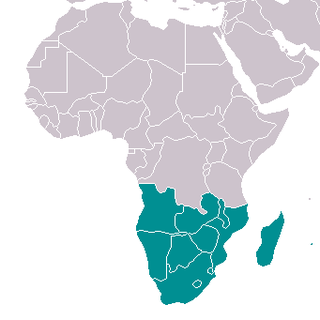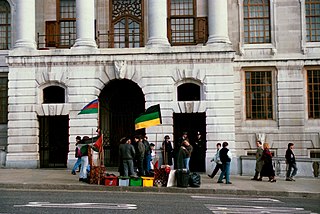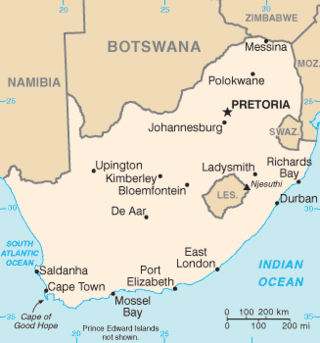A United Nations General Assembly resolution is a decision or declaration voted on by all member states of the United Nations in the General Assembly.

United Nations Security Council resolution 591, adopted unanimously on 28 November 1986, after recalling resolutions 418 (1977), 421 (1977), 473 (1980) and 558 (1984), the Council strengthened the mandatory arms embargo against apartheid South Africa imposed by Resolution 418, and made it more comprehensive. Resolution 591 sought to clarify vague terms from previous resolutions on the topic.

Foreign relations of South Africa during apartheid refers to the foreign relations of South Africa between 1948 and 1994. South Africa introduced apartheid in 1948, as a systematic extension of pre-existing racial discrimination laws. Initially the regime implemented an offensive foreign policy trying to consolidate South African hegemony over Southern Africa. These attempts had clearly failed by the late 1970s. As a result of its racism, occupation of Namibia and foreign interventionism in Angola, the country became increasingly isolated internationally.

In United Nations Security Council Resolution 417, adopted on October 31, 1977, after reaffirming Resolution 392 (1976), the Council condemned the continuing repression against black people and other opponents of apartheid, as well as the South African media and the mounting deaths of detainees. The Council foresaw that the continuation of such activities would lead to serious racial conflict with international repercussions.

United Nations Security Council Resolution 424 was adopted unanimously on March 17, 1978; after hearing representations from Zambia, the Council expressed concern at unprovoked attacks against the country by the "illegal racist regime" in Southern Rhodesia, which resulted in deaths and destruction of property in Zambia. The Rhodesian Security Forces maintained that they had been attacking guerrilla bases in the country.

United Nations Security Council Resolution 428, adopted unanimously on May 6, 1978, after hearing representations from the People's Republic of Angola, Zambia and the South West Africa People's Organisation (SWAPO), the Council reminded Member States to refrain from using threats and use of force in their international relations. Reiterating Resolution 387 (1976), the present resolution condemned South Africa for its armed invasion of Angola via South West Africa (Namibia).

United Nations Security Council resolution 447, adopted on 28 March 1979, after hearing representations from the People's Republic of Angola and the South West Africa People's Organisation (SWAPO), the Council recalled resolutions 387 (1976) and 428 (1978) and condemned South Africa for its continuing raids in direct violation of prior resolutions.

United Nations Security Council resolution 454 was adopted on 2 November 1979. After hearing representations from the People's Republic of Angola, the Council recalled resolutions 387 (1976) and 447 (1979), noting its concern and condemned the continuing attacks on the country by South Africa through illegally-occupied South West Africa.

United Nations Security Council resolution 473, adopted unanimously on 13 June 1980, after recalling resolutions 392 (1976), 417 (1977), 418 (1977), 454 (1979) and 466 (1980) and letters from the Committee for South Africa, the council expressed its concern and condemned South Africa for the killing of protesters, including schoolchildren, opposed to apartheid.

United Nations Security Council resolution 475, adopted on 27 June 1980, after hearing representations from the People's Republic of Angola, the Council recalled resolutions 387 (1976), 447 (1979) and 454 (1979), and expressed its concern and condemned the continuing attacks on the country by South Africa through occupied South West Africa.

United Nations Security Council resolution 554, adopted on 17 August 1984, after recalling 473 (1980), the Council condemned the 1984 general election in South Africa and the adoption of the Constitution of the Republic of South Africa Act.

United Nations Security Council resolution 560, adopted unanimously on 12 March 1985, after recalling resolutions 473 (1980), 554 (1984) and 556 (1984), the council condemned the continuing repression of anti-apartheid activities in South Africa, noting that the repression would undermine the possibility of a peaceful solution.

United Nations Security Council resolution 566, adopted on 19 June 1985, after recalling resolutions 269 (1969), 276 (1970), 301 (1971), 385 (1976), 431 (1978), 432 (1978), 435 (1978), 439 (1978), 532 (1983) and 539 (1983), the Council expressed concern at the tension and instability caused the continued occupation of Namibia by South Africa, noting the apartheid policies implemented in the territory and that the territory was used as a springboard for attacks on other southern African countries.

United Nations Security Council resolution 568, adopted unanimously on 21 June 1985, after hearing representations from Botswana, the Council condemned the Raid on Gaborone by South Africa, expressing its shock and indignation at the loss of life and damage to property and considered the attack as a "gross violation of the country's sovereignty and territorial integrity".

United Nations Security Council resolution 568, adopted on 26 July 1985, after expressing its outrage and concern at the suffering caused by the apartheid system in South Africa, the Council further condemned the repressive policies of the apartheid system including murders and forced removals, as well as the state of emergency imposed in 36 districts in the country, demanding it be lifted immediately.

United Nations Security Council resolution 623, adopted on 23 November 1988, the Council noted with grave concern the death sentence imposed upon anti-apartheid activist Paul Tefo Setlaba, on the basis of "common purpose" in South Africa. The resolution at the meeting urgently called by Zambia strongly urged the Government of South Africa to commute Setlaba's sentence and stay his execution in order to further avoid aggravating the situation in South Africa.

United Nations Security Council resolution 765, adopted on 16 July 1992, after recalling resolutions 392 (1976), 473 (1980), 554 (1984) and 556 (1984), the council condemned the escalating violence in South Africa, in particular the Boipatong massacre on 17 June 1992, which resulted in the deaths of 46 people, and the suspension by the African National Congress (ANC) of bilateral talks with the South African government.
The 1973 United Nations International Convention on the Suppression and Punishment of the Crime of Apartheid was the first binding international treaty which declared the crime of apartheid and racial segregation under international law. It was adopted by the General Assembly on 30 November 1973 and came into force on 18 July 1976. It passed by 91 votes in favor, four against and 26 abstentions. 110 countries are currently parties to the convention, with 26 signatories.

As a response to South Africa's apartheid policies, the international community adopted economic sanctions as a form of condemnation and pressure. Jamaica led the movement by being the first country to ban goods from apartheid South Africa in 1959.

The eleventh emergency special session of the United Nations General Assembly opened on 28 February 2022 at the United Nations headquarters. It addresses the Russian invasion of Ukraine. Maldivian politician Abdulla Shahid served as President of the body during this time.












